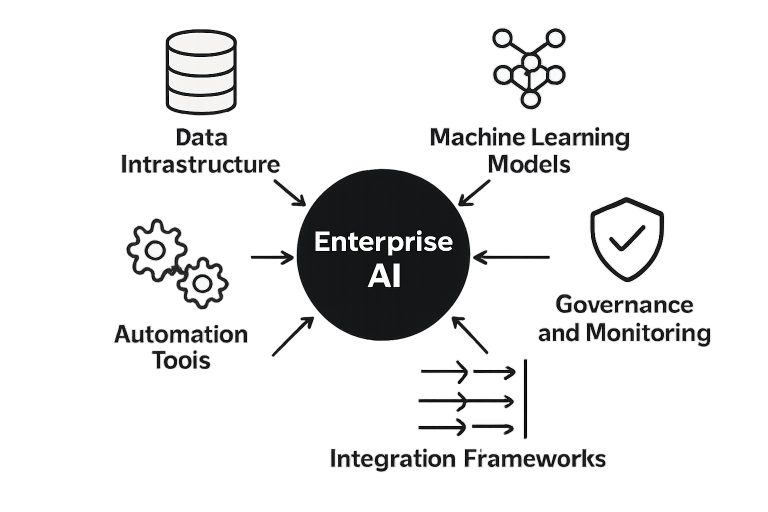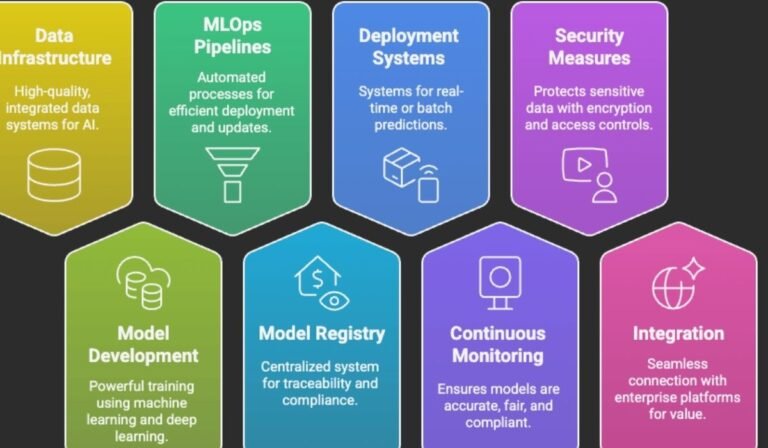As the business landscape grows more data-driven, forward-thinking organizations rapidly adopt enterprise AI to transform operations and achieve a sustained strategic advantage. Enterprise AI integrates advanced artificial intelligence technologies directly into the fabric of company workflows, moving beyond siloed projects to enable smarter, faster, and more scalable decision-making at an organizational level.
This strategic approach emphasizes the seamless embedding of AI across departments, empowering teams to convert massive data streams into tangible business value. Through coordinated AI utilization, companies enhance efficiency, innovation, responsiveness, and decision quality—cornerstones of leadership in today’s digital economy.
Successful enterprise AI implementations require foundational technology, human capital, and governance investments. Companies must centralize and cleanse their data, integrate machine learning models, and ensure that automation aligns with their business objectives. Organizational commitment to adopting change and fostering cross-functional collaboration is essential for unlocking AI’s full potential.
By harnessing AI to automate processes, optimize resources, and enable real-time insights, enterprises position themselves to outperform competitors and adapt rapidly to market dynamics. AI’s capacity to handle complexity and scale efficiently means even established organizations can keep pace with digital disruptors and shifting consumer expectations.
Key Components of Enterprise AI
To deploy enterprise AI effectively, organizations must establish a robust architecture integrating several key components:

- Data Infrastructure: A unified, scalable platform that aggregates, cleanses, and secures high-quality data from a variety of internal and external sources. This foundation is critical for reliable AI model training and accurate insight generation.
- Machine Learning Models: Purpose-built algorithms that learn from historical and real-time data, identifying patterns to automate processes, predict outcomes, and refine strategies as new information emerges.
- Automation Tools: Software solutions that manage repetitive, rules-based tasks, freeing up human talent for higher-value activities and minimizing manual errors across operations.
- Integration Frameworks: Middleware and APIs that weave AI-powered insights into existing systems, ensuring coordination across ERP, CRM, and other business platforms without workflow disruption.
- Governance and Monitoring: Policies, controls, and continuous monitoring systems that enforce transparency, model fairness, and regulatory compliance, helping to address ethical and legal risks in AI adoption.
Core Capabilities of Enterprise AI
The transformative power of enterprise AI is reflected in its ability to deliver core capabilities across the business:
- Intelligent Process Automation: AI automates routine and intricate, multi-step business processes by leveraging cognitive technologies to interpret unstructured data and adapt to dynamic workflows.
- Real-Time Decision Intelligence: Analytical engines assess large, fast-moving datasets—often from IoT devices or transactional platforms—to enable real-time predictive, data-driven operational and strategic decisions.
- Conversational AI: Natural language processing and understanding power virtual agents and chatbots that deliver immediate, scalable, and consistent interactions for customers and employees alike.
- Computer Vision: Advanced image and video analysis support automated quality assurance, predictive maintenance, and inventory management, helping to catch anomalies instantaneously and optimize resource utilization.
- Human-AI Collaboration: AI-augmented decision support systems work alongside employees, streamlining complex tasks, providing recommendations, and enabling higher accuracy in high-stakes environments.
Benefits of Implementing Enterprise AI
Organizations that invest in enterprise AI see significant operational and strategic advantages:
- Enhanced Efficiency: Automating mundane and repetitive work unleashes productivity gains and trims operational costs, allowing for focus on innovation and market growth.
- Improved Decision-Making: Timely, data-backed insights reduce guesswork and help leaders respond effectively to emerging opportunities or risks.
- Innovation Acceleration: By surfacing overlooked trends or customer needs, AI-driven analytics spark creativity and speed up the product development lifecycle.
- Competitive Advantage: Organizations leveraging AI for real-time intelligence and process optimization consistently outperform industry laggards.
Challenges in Enterprise AI Adoption
Despite its potential, enterprise AI adoption is not without obstacles. The most common challenges organizations face include:
- Data Quality and Integration: Diverse legacy systems and inconsistent data sources can hamper the formation of a cohesive data strategy—a barrier to effective AI use.
- Skill Gaps: There is a global talent shortage with deep expertise in machine learning, data science, and AI operations, creating a bottleneck for some organizations.
- Change Management: AI-driven transformation often requires significant management buy-in, employee upskilling, and cultural adaptation to new tools and working methods.
- Regulatory Compliance: Companies must stay abreast of evolving legal requirements, particularly in regulated industries, regarding data privacy, algorithmic bias, and explainability.
Future Trends in Enterprise AI
Enterprise AI is on the cusp of even greater transformation as several trends reshape its trajectory:
- Increased Personalization: AI will continually refine customer experiences and business offerings, using deep learning and behavioral analysis to deliver more individualized content, products, and services.
- Enhanced Collaboration: AI agents will facilitate tighter integration between humans and machines, not just automating tasks but proactively supporting teams and complex cross-departmental projects.
- Ethical AI Development: Organizations will prioritize transparent and fair AI deployment, prioritizing solutions that mitigate bias, promote accountability, and comply with global regulatory standards.
- Scalable AI Solutions: A move toward flexible, industry-agnostic AI platforms will enable enterprises to iterate and expand AI applications across multiple domains rapidly.
Final Thoughts
Enterprise AI stands as a transformative force for organizations navigating digital disruption. By understanding and implementing its key components and core capabilities, companies can proactively drive operational excellence, accelerate innovation, and firmly establish a competitive edge.
As artificial intelligence matures, keeping pace with new advancements and fostering a culture of ethical, data-driven decision-making will be crucial for enduring growth and leadership.
